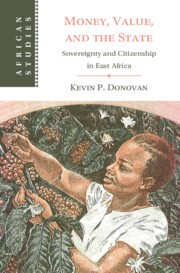Book contents
- Money, Value, and the State
- African Studies Series
- Money, Value, and the State
- Copyright page
- Dedication
- Contents
- Figures
- Acknowledgments
- A Note on the Text
- Introduction
- 1 The Moneychanger State
- 2 A Monopoly on Valuation
- 3 Restricted Value
- 4 Crimes against Economy
- 5 Magendo
- Conclusion
- Archival Collections Consulted
- Bibliography
- Index
- African Studies Series
3 - Restricted Value
Bank Nationalization and the Price of Decolonization in Tanzania
Published online by Cambridge University Press: 05 December 2024
- Money, Value, and the State
- African Studies Series
- Money, Value, and the State
- Copyright page
- Dedication
- Contents
- Figures
- Acknowledgments
- A Note on the Text
- Introduction
- 1 The Moneychanger State
- 2 A Monopoly on Valuation
- 3 Restricted Value
- 4 Crimes against Economy
- 5 Magendo
- Conclusion
- Archival Collections Consulted
- Bibliography
- Index
- African Studies Series
Summary
In 1967, Tanzania nationalized many foreign companies as part of the Arusha Declaration’s effort to create socialism and self-reliance. Among the most important were the dominant British banks that shaped investment and exported capital. Building on transcripts, private diaries, correspondence from Barclays Bank, as well as other sources, this chapter analyses how politically independent Tanzania endeavored to remake finance. Economic self-determination depended, in part, on the negotiations between Barclays and Tanzania over how much compensation government would pay for the 1967 expropriation. At stake was not merely a final price; instead, the struggle for economic sovereignty depended on the ability to determine the accounting protocols through which price would be calculated and even to define the bundle of different assets that would be subject to valuation. It was on these technicalities that postcolonial statecraft depended, meaning formulas and figures were imbued with political importance and ethical significance. Yet, ultimately, Tanzania found its authority to govern value was stymied by the enduring inequalities of the global capitalist order.
Keywords
- Type
- Chapter
- Information
- Money, Value, and the StateSovereignty and Citizenship in East Africa, pp. 148 - 210Publisher: Cambridge University PressPrint publication year: 2024

